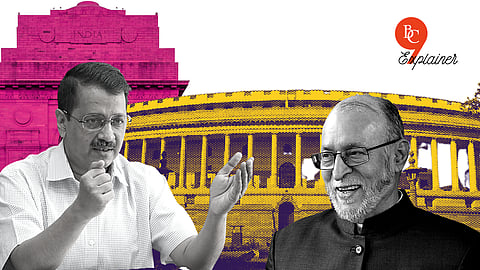

The parliament passed the contentious the Government of National Capital Territory of Delhi (Amendment) Bill 2021 (NCT Bill), which gives greater power to the Lieutenant Governor (LG). The NCT bill, which was cleared by the Lok Sabha on Monday, will amend the Government of National Capital Territory of Delhi Act, 1991, setting the stage for another round of tussles between the Arvind Kejriwal-led Aam Aadmi Party and the Centre.
In 2018, a Constitution Bench of the Supreme Court took up the dispute and ruled in favour of the elected government, clearly dividing the distribution of power between LG and the Delhi government. However, the BJP-led Centre government brought the amendment bill seeking to give effect to the Supreme Court’s interpretation, saying that the proposed new amendments define the responsibilities and power of the Lieutenant Governor and the elected government.
What are the proposed changes?
The Parliament cleared several contentious amendments on Wednesday that are going to revive the distribution of the power debate between the elected government and the LG.
Among the proposed amendments, the expression “government” in any law passed by the Legislative Assembly will now mean the LG. It is also mandatory for the Delhi government to take the opinion of the LG before taking any executive action.
Post the Supreme Court verdict in 2018, the AAP government in Delhi had stopped sending files on executive matters to the LG. However, now it will have to abreast the LG about all the administrative work before implementing its decisions.
According to the new Act, the elected government is also prohibited from making up any committees to take up matters of day-to-day matters of administration or to conduct inquiries in relation to administrative decisions. This will be a bigger jolt to the AAP government as it has already constituted multiple committees examining matters ranging from riots to the environment.
What did Supreme Court say in 2018?
The Constitution Bench of the Supreme Court had ruled that LG has no independent decision-making powers and was bound to follow the ‘advice and aid’ of the Delhi government on all matters except those pertaining to public order, land, and police.
The apex court had clearly stated that the role of the LG is of an administrator in a limited sense rather than of a governor. It also cautioned the LG to use his power only in exceptional cases and not in a routine mechanical manner.
Citing the Balkrishnan Committee Report of 1987, the apex court stated that Delhi is not a state. Hence, Delhi's LG was not a mere Constitutional figurehead but also bore the title of administrator.
What did the AAP government say?
After the bill was passed in Parliament, Delhi Chief Minister Arvind Kejriwal tweeted that it is a ''sad day for Indian democracy'. He also accused the BJP of curtailing the powers of an elected government.
Reacting to the bill, Deputy Chief Minister Manish Sisodia termed it as a black day for Indian democracy.
AAP MP Sanjay Singh said the bill brought by the Bharatiya Janata Party (BJP) has twice lost elections to AAP in Delhi.
“I seek justice for the 2 crore people of Delhi, for 130 crore Indians, to seek justice from all members to save Constitution. I am telling all members - we'll be here only if Constitution is there," he said in Rajya Sabha.
Earlier, AAP Rajya Sabha member Narain Dass Gupta said the party will approach the Supreme Court.
"If the GNCT Amendment Bill 2021 is passed by the Rajya Sabha today, we will go to the Supreme Court because we don't have any other option," Gupta told the news agency ANI.
What transpired in Rajya Sabha?
In a rare show of unity, all opposition parties opposed the bill, stating that the proposed amendment bill is unconstitutional and weakens cooperative federalism in the country.
Leader of opposition in the Upper House, Mallikarjun Kharge opposed the amendments and said, “This Bill is to take the rights from the representatives of the people and to put the LG in charge. What is the point of elections if you are making the LG the leader?”
TMC’s Derek O'Brien made a strong pitch for sending the bill to the Select Committee while BJD's Prasanna Acharya said the Centre should have held wider consultations before bringing this bill. "My party does not want to be a party to this bill. We are staging a peaceful walkout," he said.
DMK’s P Wilson termed the bill as "blot on the Constitution", while SP’s V P Nishad and Jharna Das Baidya of CPI-M too opposed the bill terming it unconstitutional.
RJD’s Manoj Jha (RJD) said his party was opposing the proposed law "on constitutional parameter and moral principles".
The Congress’s Abhishek Manu Singhvi described the Bill as a “most unconstitutional Bill” that the House had ever considered, “Make no mistake friends, this is not about AAP, or Congress or BJP. It’s about the fundamentals of federalism,” he said, adding that “even the Delhi BJP should join us in opposing this”.
Meanwhile, defending the bill, Minister of State for Home Affairs, G Kishan Reddy said the amendments have been brought to address certain ambiguities in the 1991 law and rejected accusations that it intended to take away the powers of the elected government.
“The proposed Bill does not curtail in any manner any of the powers enjoyed by the government of NCT Delhi which is already provided in the Constitution,” he said.
